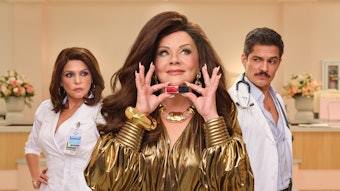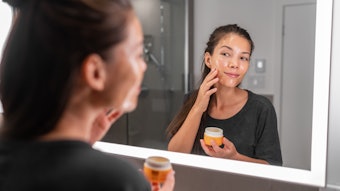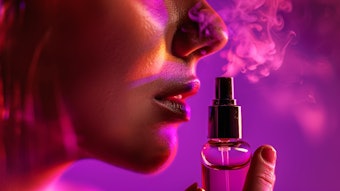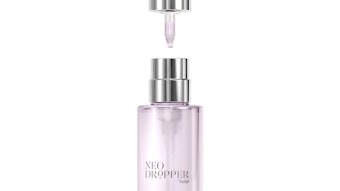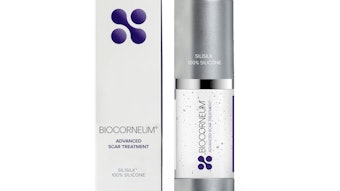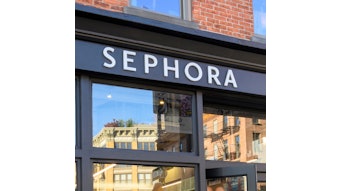
JooMo will take part in the 2018 Skin Microbiome Congress: Translating microbiome research into clinically & commercially viable cosmetics & therapeutics, revolutionizing dermatology, which will be held May 30–31 in Boston. Click here for more details.
When it comes to healthy skin, biodiversity is everything—at least according to Kit Wallen-Russell, director of the Pavane Research Centre, the R&D arm behind JooMo’s microbiome-friendly skin care technology. And new research purports to show just how important product selection can be. (Data shown above.)
Wallen-Russell recently spoke to Global Cosmetic Industry as he prepared to publish his latest research, which features results from clinical trials conducted with the Medical University of Graz in Austria that sought to address a fundamental question: “Are modern cosmetics a cause of the skin allergy epidemic?”
The question arose from the rise in skin allergies in the modern era, a challenge that spiked in the last decade, according to Wallen-Russell. He partially attributes these complications to the products consumers apply to their bodies. (Other causes include highly processed modern diets and the rise of cleanliness culture, he adds.)
While Wallen-Russell wouldn’t explicitly preview his study to Global Cosmetic Industry, he appears to have determined the effects of everyday cosmetics on skin health.
Further reading: Prebiotic & Postbiotic Skin Care: A Balncing Act
The latest study involved 30 volunteers broken up into three groups: one used skin care products marketed as natural, another used conventional skin care products and the final group used JooMo’s microbiome-friendly products. Wallen-Russell explained that the “natural” and conventional products used by the first two groups both contained some portion of synthetic materials.
JooMo is focused on revolutionizing the skin care industry, according to Wallen-Russell, primarily by being honest, improving health and giving the consumer “justice for their skin.”
The researchers took a skin biodiversity baseline at the start of the trial, then tested that same skin midway through the research and again at the conclusion. Skin health throughout was measured by the biodiversity of the skin microbiome. The more diverse a microbiome becomes, the stronger the skin barrier and the greater the overall skin health.
Per the figure shown in the slides above, the study found that JooMo's products significantly increase microbial diversity and, as a result, skin health, in two weeks or sooner.
Further results will be exclusively revealed at the 2018 Skin Microbiome Congress.
Wallen-Russell is looking to scale up the research in a future study.
Formulations Safe Enough to Eat
The brand’s range of products includes its flagship preservative-free JooMo 100% Natural Body Wash (retail: £23.50), which can be used as a cleanser, moisturizer and shave product all in one. The formulation is reportedly appropriate for addressing acne, spots, blackheads, rashes, soreness, cold sores, eczema, allergies and more on all skin types. The body wash prevents inflammation and irritation by providing the conditions under which beneficial skin bacteria can thrive in a diverse microbiome.
Wallen-Russell says future products will include a shave gel, shampoo, anti-acne lotion and anti-aging lotion.
JooMo’s innovation is built on a foundation of conventional ingredients that are likely to be familiar with consumers. Its ingredients work in a synergy greater than the sum of their parts, according to Wallen-Russell.
Key components include saponins from Indian soap nuts, which cleanse without drying the skin or altering its natural pH. These materials also act as anti-irritant, anti-oxidant, anti-inflammatory and anti-allergic agents, and offer antimicrobial, anti-viral, anti-fungal and anti-carcinogenic properties. Saponins also offer deodorant properties.
Raw thyme honey, on the other hand, softens, moisturizes, heals and calms sore skin while offering anti-bacterial, anti-fungal, antimicrobial and anti-inflammatory activity. The inclusion of astringent orange juice reduces oiliness and shrinks pores, helping to modify pH, stimulate the metabolism and eradicate acne.
The JooMo washes offer consumers a chance to protect their microbiome by allowing it to flourish and rebuild its natural defenses.
Meanwhile, organic sea salt addresses acne, eczema and psoriasis, reduces inflammation, improves circulation and heals sore skin. It also restores balance to greasy or dry skin, gets rid of impurities, stimulates the skin’s own activity, imparts minerals and trace elements to the skin, renews the complexion and offers healing properties. The inclusion of unrefined, raw cane sugar offers anti-bacterial activity and helps to maintain optimal skin flora.
JooMo’s formulations are also free from sulfates, soaps, fragrances and other commonly maligned ingredients.
The brand encourages users not to use other products in conjunction with its brand in order to generate the best results.
"For the first time we propose benchmark values of diversity against which we can measure skin to determine how healthy it is."
JooMo also offers the 100% Natural Face Wash for Boys and 100% Natural Face Wash for Girls (retail £12.50). Wallen-Russell notes that the two formulations don’t exist because skin is fundamentally different from one gender to the next, but rather because girls and boys tend to expose their skin to different types of stressors. As a result of more rigorous use of beauty and skin care, he said, girls tend to have more sensitive skin than their male counterparts.
The JooMo washes offer consumers a chance to protect their microbiome by allowing it to flourish and rebuild its natural defenses.
Defining Diversity
The latest research from JooMo posits that no single organism is solely responsible for skin health. Therefore, healthiness is linked to high biodiversity within the skin’s ecosystem. But to measure biodiversity, Wallen-Russell and his partners used the Chao biodiversity index, which skews data sets toward so-called low-abundance—or, rare—species. The reasoning being that rare species will only be present in highly diversified systems.
“For the first time we propose benchmark values of diversity against which we can measure skin to determine how healthy it is.
(For an analogy, consider the likelihood of finding a rare tree frog in a low-biodiversity environment, versus a high-biodiversity environment. Inevitably, the tree frog’s mere presence will signal a greater degree of biodiversity compared to an environment in which the same animal is not found.)
A new approach is required.
This method stands in contrast to the widely used Shannon diversity index, which primarily assesses general species abundance and evenness.
Wallen-Russell’s original 2017 publication* argues, “For the first time we propose benchmark values of diversity against which we can measure skin to determine how healthy it is. This gives us the ability to be able to predict which people are more likely to be prone to skin ailments, and start to test whether cosmetic ingredients and products are a main cause of the skin allergy epidemic.”
The Founding Story The JooMo brand was born when Wallen-Russell’s mother, Linda Russell faced her own skin issues, which she was unable to resolve with conventional and natural ointments and washes, as well as steroid creams that exacerbated her condition.
JooMo is focused on revolutionizing the skin care industry.
Linda Russell’s experience mimicked research out of the University of Florence that found that children from rural Burkina Faso, who consumed polysaccharide-rich, non-Westernized diets had vastly healthier gut microbiota, compared to their Western counterparts, as well as the so-called uncontacted Yanomami peoples of Brazil and Venezuela, which, according to US and Latin American researchers, harbor an unprecedentedly diverse microbiome and genetic function.
Like other players in the microbiome-friendly skin care market, JooMo posits that modern cosmetic products and excessive cleanliness have exacerbated skin problems in the modern era by disrupting the natural state of skin microbiota in the same way non-native species can wreak havoc in a regional ecosystem. Therefore, the brand argues, a new approach is required.
Not a Beauty Brand
JooMo is focused on revolutionizing the skin care industry, according to Wallen-Russell, primarily by being honest, improving health and giving the consumer “justice for their skin.”
The brand doesn’t shy away from its technical message. Wallen-Russell stresses that JooMo will expand into salons, including 200 doors in Australia, as well as clinics and hospitals. JooMo, he explicitly says, will not be a beauty brand, but rather a health solution.
*Christopher Wallen-Russell and Sam Wallen-Russell, Meta Analysis of Skin Microbiome: New Link between Skin Microbiota Diversity and Skin Health with Proposal to Use This as a Future Mechanism to Determine Whether Cosmetic Products Damage the Skin. Cosmetics, 4(2), 14, 2017; doi:10.3390/cosmetics4020014
